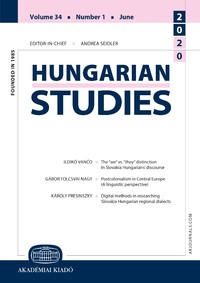Postcolonialism in Central Europe • (A linguistic perspective)
Postcolonialism in Central Europe • (A linguistic perspective)
Author(s): Gábor Tolcsvai NagySubject(s): Finno-Ugrian studies
Published by: Akadémiai Kiadó
Keywords: communication forms; colonialism; Central Europe; Hungarian language community; Hungarian minorities; postcolonialism
Summary/Abstract: The paper discusses the post-1990 historical developments in Central Europe as a specific instantiation of postcolonialism, particularly in the linguistic domain. After the severe communist rule and Soviet military occupation in most countries (which enjoyed a non-typical colonial status), this region was freed, but many socio-cultural features of culture, language policy, language use, and everyday communication activities show that many forms practiced during the colonial period are still maintained. These remnants show a certain postcolonial way of life in the region. The paper first surveys the literature, discussing the validity of the notion of postcolonialism for the given period in Central Europe. In the second part, general postcolonial features pertaining to the Hungarian language community are introduced. These features are detailed first focusing on the developments in Hungary, then on the minority Hungarian communities across the border around Hungary. Factors are presented including communicative systems, language policy, language variants, reflection, and self-reflection on the language community and identification, language rights, and public education, with attention paid to adherence to colonial schemas and the quick transition to postmodern communication forms.
- Issue Year: 34/2020
- Issue No: 1
- Page Range: 47-59
- Page Count: 13
- Language: English
- Content File-PDF

